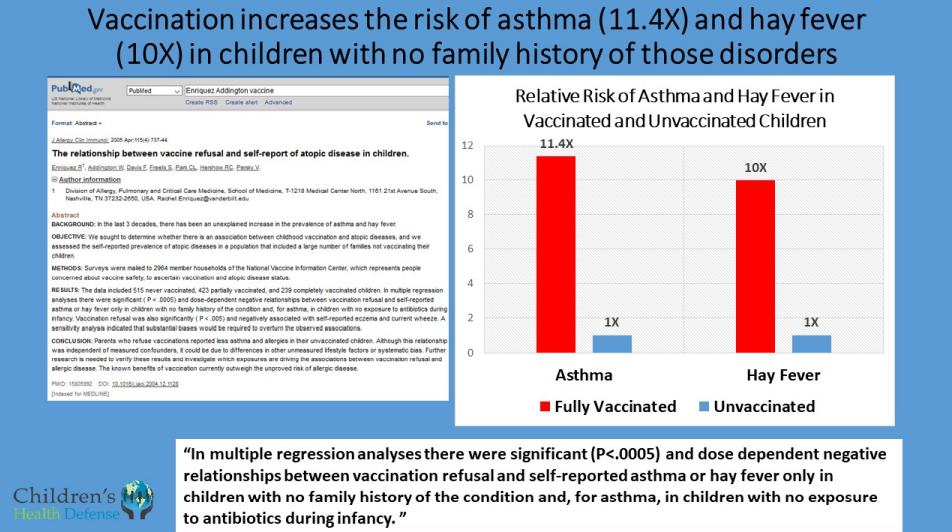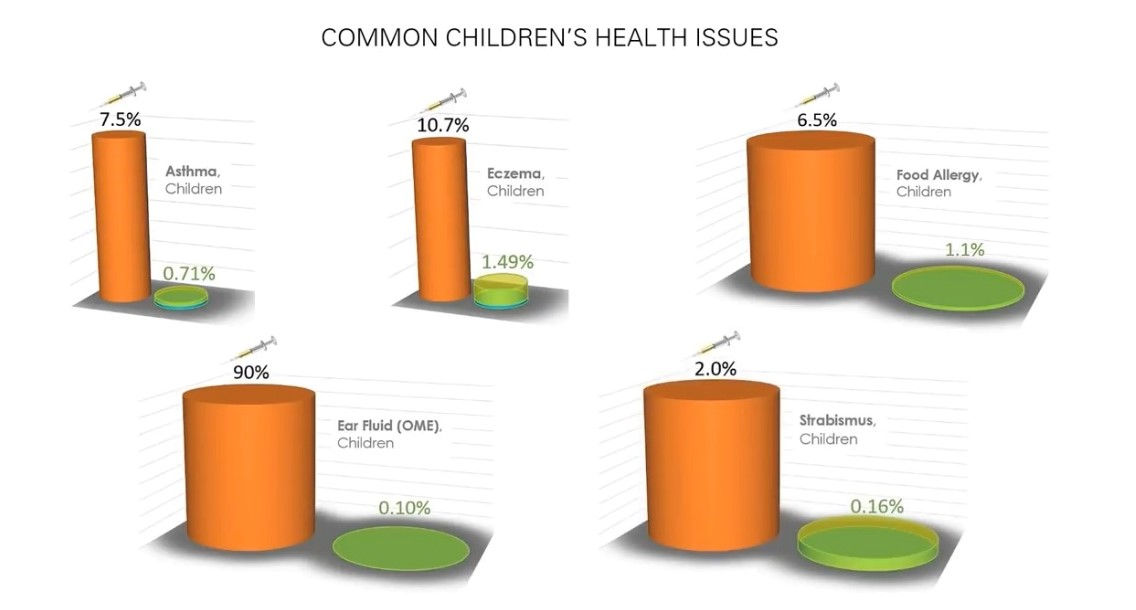
Why I Won't Vax
Vaxxed vs. Unvaxxed, who is healthier?
The CDC admits they have never conducted a study on fully vaccinated versus fully unvaccinated to compare overall health outcomes. The argument is that it would be "unethical" to withhold vaccines from individuals when a vaccine does exist. A strange argument considering vaccines are withheld from those involved in the safety studies done by the manufacturers prior to licensing. Except in these studies the individuals in the control groups are given the vaccine minus the antigen component or injections of toxic substances such as aluminum. (See Inadequate Safety Testing).
Also, the CDC has the medical records for millions of Americans that could be used to compare the health outcomes without having to withhold vaccines from anyone. They still refuse to do the study.
However, studies by independant doctors and scientists have been done. Here are some of the findings.

From ICAN
CDC CONCEDES IT HAS NEVER CONDUCTED STUDY OF VACCINATED VS. UNVACCINATED CHILDREN
On July 29, 2020, after months of false claims and objections, the CDC finally conceded that it could not find a single study comparing health outcomes between vaccinated and unvaccinated children and that it “has not conducted a study of health outcomes in vaccinated vs unvaccinated populations.”
Data from Dr. Paul's practice, published in the International Journal of Environmental Research and Public Health showed the unvaccinated had superior health outcomes when compared to those variably vaccinated or vaccinated according to the Vaccine-Friendly Plan. Since there was essentially no child in Dr Paul's practice who was following the CDC schedule, one would have to compare these health outcomes with the going rates in America as most in the US vaccinate according to the CDC schedule.
Vaxxed vs. Unvaxxed Studies
What do they show?
(Slides from Children's Health Defense)
November 14, 2007
Carolyn Gallagher &Melody Goodman
Hepatitis B triple series vaccine and developmental disability in US children aged 1–9 years
This study found statistically significant evidence to suggest that boys in United States who were vaccinated with the triple series Hepatitis B vaccine, during the time period in which vaccines were manufactured with thimerosal, were more susceptible to developmental disability than were unvaccinated boys.

This study found statistically significant evidence to suggest that boys in United States who were vaccinated with the triple series Hepatitis B vaccine, during the time period in which vaccines were manufactured with thimerosal, were more susceptible to developmental disability than were unvaccinated boys.

This study found statistically significant evidence to suggest that boys in United States who were vaccinated with the triple series Hepatitis B vaccine, during the time period in which vaccines were manufactured with thimerosal, were more susceptible to developmental disability than were unvaccinated boys.
April 1, 2005
Rachel Enriquez 1, Whitney Addington, Faith Davis, Sally Freels, C Lucy Park, Ronald C Hershow, Victoria Persky
The relationship between vaccine refusal and self-report of atopic disease in children
arents who refuse vaccinations reported less asthma and allergies in their unvaccinated children.

arents who refuse vaccinations reported less asthma and allergies in their unvaccinated children.

arents who refuse vaccinations reported less asthma and allergies in their unvaccinated children.
May 20, 2000
M Hotopf 1, A David, L Hull, K Ismail, C Unwin, S Wessely
Role of vaccinations as risk factors for ill health in veterans of the Gulf war: cross sectional study
Among veterans of the Gulf war there is a specific relation between multiple vaccinations given during deployment and later ill health.

Among veterans of the Gulf war there is a specific relation between multiple vaccinations given during deployment and later ill health.

Among veterans of the Gulf war there is a specific relation between multiple vaccinations given during deployment and later ill health.
January 16, 1999
C Unwin 1, N Blatchley, W Coker, S Ferry, M Hotopf, L Hull, K Ismail, I Palmer, A David, S Wessely
Health of UK servicemen who served in Persian Gulf War
Vaccination against biological warfare and multiple routine vaccinations were associated with the CDC multisymptom syndrome in the Gulf War cohort.

Vaccination against biological warfare and multiple routine vaccinations were associated with the CDC multisymptom syndrome in the Gulf War cohort.

Vaccination against biological warfare and multiple routine vaccinations were associated with the CDC multisymptom syndrome in the Gulf War cohort.
April 29, 1995
N P Thompson 1, S M Montgomery, R E Pounder, A J Wakefield
Is measles vaccination a risk factor for inflammatory bowel disease?
Increased prevalence of inflammatory bowel disease, but not coeliac disease or peptic ulceration, was found in the vaccinated cohort compared with their partners. These findings suggest that measles virus may play a part in the development not only of Crohn's disease but also of ulcerative colitis.

Increased prevalence of inflammatory bowel disease, but not coeliac disease or peptic ulceration, was found in the vaccinated cohort compared with their partners. These findings suggest that measles virus may play a part in the development not only of Crohn's disease but also of ulcerative colitis.

Increased prevalence of inflammatory bowel disease, but not coeliac disease or peptic ulceration, was found in the vaccinated cohort compared with their partners. These findings suggest that measles virus may play a part in the development not only of Crohn's disease but also of ulcerative colitis.
December 31, 2007
John Barthelow Classen
Risk of Vaccine Induced Diabetes in Children with a Family History of Type 1 Diabetes
Pediatric vaccines were associated with a statistically significant increased risk of type 1 diabetes in 12 of 21 endpoints in the general population

Pediatric vaccines were associated with a statistically significant increased risk of type 1 diabetes in 12 of 21 endpoints in the general population

Pediatric vaccines were associated with a statistically significant increased risk of type 1 diabetes in 12 of 21 endpoints in the general population
February 23, 2000
E L Hurwitz 1, H Morgenstern
Effects of diphtheria-tetanus-pertussis or tetanus vaccination on allergies and allergy-related respiratory symptoms among children and adolescents in the United States
The odds of having a history of asthma was twice as great among vaccinated subjects than among unvaccinated subjects

The odds of having a history of asthma was twice as great among vaccinated subjects than among unvaccinated subjects

The odds of having a history of asthma was twice as great among vaccinated subjects than among unvaccinated subjects
November 15, 2000
L Steele 1
Prevalence and patterns of Gulf War illness in Kansas veterans: association of symptoms with characteristics of person, place, and time of military service
Observed patterns suggest that excess morbidity among Gulf War veterans is associated with characteristics of their wartime service, and that vaccines used during the war may be a contributing factor.

Observed patterns suggest that excess morbidity among Gulf War veterans is associated with characteristics of their wartime service, and that vaccines used during the war may be a contributing factor.

Observed patterns suggest that excess morbidity among Gulf War veterans is associated with characteristics of their wartime service, and that vaccines used during the war may be a contributing factor.
May 10, 1999
M A Fisher 1, S A Eklund
Hepatitis B vaccine and liver problems in U.S. children less than 6 years old, 1993 and 1994
Hepatitis B vaccinated children had an unadjusted odds ratio of 2.94 and age-adjusted odds ratio of 2.35 for liver problems compared with non-hepatitis B vaccinated children in the 1993 National Health Interview Survey. Hepatitis B vaccinated children had an unadjusted odds ratio of 2.57 and age-adjusted odds ratio of 1.53 for liver problems compared with non-hepatitis B vaccinated children in the 1994 National Health Interview Survey dataset.

Hepatitis B vaccinated children had an unadjusted odds ratio of 2.94 and age-adjusted odds ratio of 2.35 for liver problems compared with non-hepatitis B vaccinated children in the 1993 National Health Interview Survey. Hepatitis B vaccinated children had an unadjusted odds ratio of 2.57 and age-adjusted odds ratio of 1.53 for liver problems compared with non-hepatitis B vaccinated children in the 1994 National Health Interview Survey dataset.

Hepatitis B vaccinated children had an unadjusted odds ratio of 2.94 and age-adjusted odds ratio of 2.35 for liver problems compared with non-hepatitis B vaccinated children in the 1993 National Health Interview Survey. Hepatitis B vaccinated children had an unadjusted odds ratio of 2.57 and age-adjusted odds ratio of 1.53 for liver problems compared with non-hepatitis B vaccinated children in the 1994 National Health Interview Survey dataset.











